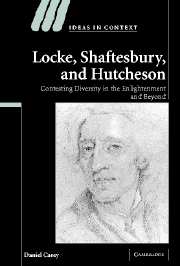Book contents
- Frontmatter
- Contents
- Acknowledgements
- Abbreviations
- Introduction
- 1 Locke, diversity, and the natural history of man
- 2 The uses of diversity: Locke's sceptical critique of Stoicism
- 3 Locke's anthropology: travel, innateness, and the exercise of reason
- 4 Contesting diversity: Shaftesbury's reply to Locke
- 5 Method, moral sense, and the problem of diversity: Francis Hutcheson and the Scottish Enlightenment
- 6 Conclusion: the future of diversity
- Bibliography
- Index
1 - Locke, diversity, and the natural history of man
Published online by Cambridge University Press: 22 September 2009
- Frontmatter
- Contents
- Acknowledgements
- Abbreviations
- Introduction
- 1 Locke, diversity, and the natural history of man
- 2 The uses of diversity: Locke's sceptical critique of Stoicism
- 3 Locke's anthropology: travel, innateness, and the exercise of reason
- 4 Contesting diversity: Shaftesbury's reply to Locke
- 5 Method, moral sense, and the problem of diversity: Francis Hutcheson and the Scottish Enlightenment
- 6 Conclusion: the future of diversity
- Bibliography
- Index
Summary
In April 1683, John Locke wrote to an agent of the East India Company who was shortly to depart for Cossimbazar, asking for information on India. Published accounts had whetted Locke's appetite and he sought a more ‘exact’ description from an eyewitness whose observations he could direct and whose testimony would answer his curiosity. Locke noted:
Some of those who have traveld and write of those parts, give us strange storys of the tricks donne by some of their Juglers there, which must needs be beyond leger de main and seeme not within the power of art or nature. I would very gladly know whether they are really donne as strange as they are reported …
Consistent with his long-standing interest in comparative religion and the problem of enthusiasm, Locke went on to express an interest in tales of apparitions and spirits, as well as the religious opinions and ceremonies of Hindus and other sects in the country. But he hoped, in fact, for a thorough ethnography, which would include detail on the languages, learning, government, and manners of the country, together with information on Aurengzib, the famed Mughal emperor.
By framing these inquiries, Locke followed a well-established practice among devotees of the new science. The Royal Society often enlisted the energies of voyagers in describing the physical world. Locke's extension of methods associated with natural history to include the natural history of man provides the focus of this chapter.
- Type
- Chapter
- Information
- Locke, Shaftesbury, and HutchesonContesting Diversity in the Enlightenment and Beyond, pp. 14 - 33Publisher: Cambridge University PressPrint publication year: 2006

